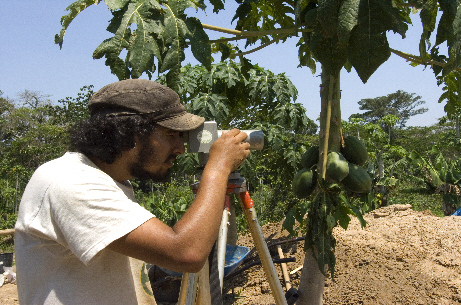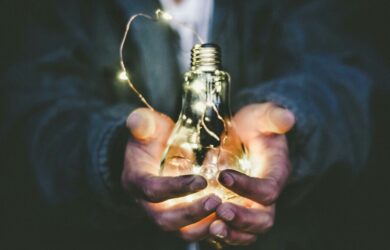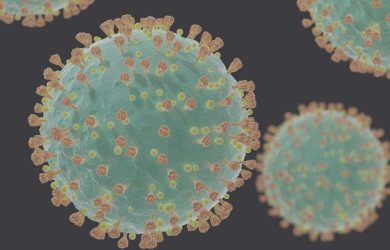
Eduardo Machicado Murillo has just opened up his family's library to the public.
Eduardo Machicado Murillo’s archaeological research investigates the distant past, but his own family past, though less distant, has had a huge impact on his academic career and his motivation to give something back to the community in the form of a public library based on his family’s huge collection of books.
His great grandfather was a mining prospector who discovered a large mine in 1904. “Bolivia was like the Wild West at the time,” says Eduardo. “He made a big fortune and wanted his children to have the best education. He sent my grandfather to the US in 1914 where he studied at Harvard. When he returned in 1922 he took over the quarry and the family business. He lived in a big house and built up a library of over 30,000 books and a co0llection of 7000 records of classical music. My grandfather passed on his emphasis on education to my dad and his desire to share the educational resources he had amassed with others who were less fortunate.”
Eduardo [2011] grew up in La Paz with a deep interest in reading and social sciences. “It was a very rational, anti-religious, left-wing household,” he says. His dad had been imprisoned for his political views by the military government and was expelled in the 1970s. He travelled to Allende’s Chile and then to Sweden.
On his return to Bolivia he met Eduardo’s mother who was an architect. She dedicated herself to alternative medicine after Eduardo’s younger brother died of the chicken pox when he was just six because of a medical error.
“I was seven at the time. His death had a really big impact on me,” says Eduardo. “I stayed away from doctors while I was at high school.”
He went to a private Jesuit high school and says he was a very shy, serious student. “I spent most of my time reading,” he says.
The Jesuits emphasised the importance of getting involved in activities which would help the community. “Instead of going on a trip to celebrate our graduation we were expected to go to the countryside to do community work,” he says. This gave him the opportunity to go for the first time to the tropical lowlands of Bolivia where he worked on road construction.
When he left school, he says he was very confused about his future. Part of his family wanted him to go to the US, but he didn’t want to leave his family. Eduardo’s only option if he wanted to study science was to go to the free state university, Universidad Mayor de San Andres. He matriculated in 1999 and aimed to study anthropology and archaeology.
“On the side of my mum, my grandfather spent most of his life exploring different parts of Bolivia. I guess listening to his stories made me a little bit of an adventurer so doing both archaeology and anthropology sounded right to me, although maybe for the wrong reasons,” he says.
The state university was considered “a revolutionary institution” and it was a completely new experience for Eduardo, having come from a private school.
“There were a lot of marches and it was a hive of active resistance to the government. It was very socially mixed and I made some great friends there. It really opened my eyes,” he says.
He got involved in field archaeology at the age of 20, first working as a technician for the German Institute of Archaeology and later doing research for the University of California, Berkeley. After finishing his undergraduate degree, he decided to move to the United States to take advantage of the libraries and academic environment there.
In the US he realised that he could make a living as an academic. “The Bolivian university system is against the idea of creating pure academics. We were always reminded about how privileged we were and of our responsibility to give back to the community,” he says.
He started attending conferences and presenting papers. He also wrote a dissertation, which he finished in 2007. It will be published next year and is based on his research in the transformation of pre-Columbian funeral practices in Lake Titikaka.
His supervisor in the US suggested he apply to Cambridge for his MPhil in Archaeological Research. He completed that and applied for his PhD, for which he received a Gates scholarship. His PhD continues his master’s research in the Llanos de Moxos area of eastern Bolivia. There he is studying drained field agriculture and its relationship to the development of early complex societies in tropical environments. He says that the Bolivian Amazon has not been properly explored before. “We tend to think we know a lot about the past everywhere in the world but this is not true. We do not know much about the Amazon forest. Sometimes it is hard to believe that the history of a place that is roughly the size of Europe is still completely unknown,” he says.
Recent research in the area suggests that climate change in the past may have played an important role in how the area has developed. “While the environment played a huge role I am convinced that something else was happening. We imagine the Amazon as being populated by small communities who are into hunting, foraging and fishing. However, this seems to be a fairly recent way of life. In the distant past big agricultural communities lived there.”
He hopes his work will help reveal the unknown history of the present indigenous communities and have a positive impact on the development of policies relating to heritage and forest management.
Eduardo is also keen to give something more concrete back to Bolivia and to promote the study of social science in Bolivia. For this reason he and his sister have just opened their grandfather’s collection of books to the public.
He says he was impressed by the US academic library system when he was there. “Such a system doesn’t exist in Bolivia and it hinders people’s ability to do research,” he says.
He was also interested in the Gates Foundation’s work on creating global libraries. “My grandfather’s dream was to make his library open to the public. My father was determined to fulfil that dream and set up a non-profit organisation in 1992; my sister and I are just continuing that legacy.”
“I grew up in a very privileged position and I feel it is my duty to give something back,” he says, adding that he was inspired by his grandfather’s tradition of opening up his house for weekly public music sessions. “My grandfather had a big classical music collection and would open the doors of his house every Saturday to allow people to listen to classical music for free,” he says.
“He started doing this back in 1916 and my father continued the tradition. Sometimes it is hard to believe our family has been doing this for almost a century now. My grandfather has been an immense influence on our family. When my father was my age he asked him: Why do you do this? He responded: “Son, to have so much and not to share it would be a crime”.












